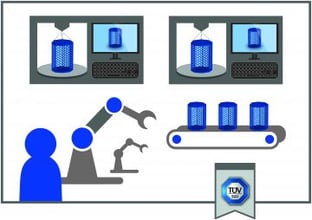Up to now, additive manufacturing has mainly involved prototypes and small quantities. Where larger batches are concerned, it is a challenge for companies to maintain consistently high product quality levels across different locations.
In his guest commentary, Gregor Reischle, Head of Additive Manufacturing at TÜV SÜD, presents a certification method to ensure quality in additive manufacturing processes.
A paradigm shift in process qualification procedures is necessary to make additive manufacturing (AM) possible on an industrial scale. To achieve this, all the quality factors specific to production need to be monitored. These include:
- Hardware
- Software
Documentation - Inspection device maintenance and calibration
- Component history
- Material history
- CAD processes, as well as
- Data processing.
Just as crucial in an industrial context are the trained experts, i.e. the operators, engineers, quality managers, project managers and even the sales staff.
CLASSIC VERSUS ADDITIVE MANUFACTURING – DIN SPEC 17071 ILLUSTRATES THE DIFFERENCES
To date, very little experience has been made with the implementation of additive manufacturing processes – and there is a lack of appropriate standards. A guideline for uniform quality assurance practices only came into being in November 2019. With the help of this new standard, manufacturers can now set up a production process with minimized risks and established quality assurance procedures within a period of six months. In the past, the process of establishing such quality-assured production processes sometimes dragged on for several years.
DIN SPEC 17071 summarizes the state of the art in the additive manufacturing area and is easy to implement because the quality requirements can be clarified on a component or product-specific basis. This leads to a set of complete and reliable specifications which makes cooperation with material suppliers and contract manufacturers much easier. These summarized, product-specific requirements can then be met in a target-oriented and calculable manner. And last but not least, this minimizes the number of supplier audits needed and simplifies the component purchasing process.
Examples of institutions and committees that are currently working on standards for additive manufacturing:
- TÜV SÜD Product Service
- German Institute for Standardization (DIN NA 145 Additive Manufacturing)
- ISO Joint Committee (ISO/TC 261)
- ASTM International

The aim of the guideline is to simplify quality assurance processes for the additive manufacturing area along the global value chain.
GETTING AM PRODUCTION FACILITIES CERTIFIED
Due to the dynamic market and large number of suppliers involved, there are increasing demands from both manufacturers and suppliers for an independent assessment procedure. The certification of “industrial production facilities” carried out by TÜV SÜD Product Service is aimed at ensuring reliable production quality levels. It covers machines, materials, processes and methods, as well as personnel. This certification focuses on material testing and the transparent documentation of machine acceptance, as well as on the management of all the processes involved in production.
This involves supplementing general additive manufacturing standards with technology-specific ones – for example, various VDI guidelines on plastic components, laser sintering and design recommendations. DIN 35224 on the acceptance of powder bed-based laser beam machines and DIN 65123 on the inspection of metallic components also play a role. In regulated industries, such as the aviation sector, medical field or railway industry – but also in the printing equipment sector and field of safety-relevant components – corresponding requirements are also included in the scope of the certification.
INTERNATIONAL NETWORK OF MANUFACTURING PARTNERS
Manufacturers must be in a position to minimize their risks and make investments in new production lines or locations in a transparent and calculable fashion. Decentralized production facilities with shorter delivery times can also be set up more easily, if all the partners along the value chain are certified according to recognized standards. Against the background of an international manufacturing network with established quality assurance processes, TÜV SÜD has agreed on a cooperation with ASTM International, the US-American standards organization. For the future, the organizations are planning to hold joint conferences, training courses and workshops and are striving for close cooperation in the qualification and certification field.
With the aim of gaining additional partners to develop technical solutions, TÜV SÜD is also cooperating with other users and organizations in the field of additive manufacturing, such as the Aachen Center for Additive Manufacturing (ACAM).

In the additive manufacturing area, quality assurance begins with a virtual mapping.
THE FUTURE OF COMPONENT CERTIFICATION IS DIGITAL
As it is possible to almost completely digitize the process chain in an additive manufacturing environment, the experts are able to create a virtual image of a component via the respective preparatory steps and using process sensor technology. This provides the option of gradually replacing non-value-adding steps in the quality assurance process with an automated “runtime approval” process. The aim is to realize the vision of component-specific testing using digital test stations and to make the approval of additively manufactured products reliable and efficient.
Within the framework of the “iAM Digital certification” concept study for digital certification, it is planned to automatically certify components across locations later on using a digital fingerprint – in order to create transparency and ensure product-specific quality levels are maintained in the future.
Gregor Reischle
Gregor Reischle is engineer, consultant and senior additive manufacturing expert with an Executive MBA in Innovation and Business Foundation from the TUM School of Management in his pocket. Besides establishing 3D printing technologies in the production area, Reischle is passionate about quality assurance, lean entrepreneurship and leadership in general. In his current role as Head of Additive Manufacturing at TÜV SÜD, Reischle is responsible for defining the AM strategy and business plan within the additive manufacturing section – his vision being to lead AM technologies to success in the industrial environment. He founded and now leads a team of 20 experts in Munich, Singapore and Tokyo.

